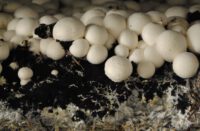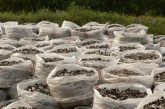A research group in Australia has embarked on the development of biodegradable plastic bags for mushroom cultivation. Led by Dr. Nasim Amiralian, a researcher at the Australian Institute for Bioengineering and Nanotechnology at the University of Queensland, the research group initiated the project in collaboration with Scenic Rim Mushrooms in Queensland. The goal is reduce the amount of plastic waste that has become a growing problem in the mushroom industry.
Plastic waste piles up – a pressing issue
In the mushroom industry worldwide, traditional bag or block cultivation methods are still prevalent. For button mushrooms, modern shelf-based, bulk compost technology is gaining ground, but the use of bags is still common. When it comes to oyster mushrooms and exotics, like shiitake, king oyster, enoki, etc., the use of bags is widespread. Modern technologies also employ bottle cultivation, but the main cultivation vessels are made of plastic there as well.
During mushroom cultivation, the plastic bags and block coverings are single-use. It’s leading to the disposal of plastic waste in landfills or incinerators. This, of course, poses a significant environmental burden. Additionally, the removal of plastic film waste during the utilization of spent mushroom compost presents a major obstacle.
Biodegradable plastic bags as the solution
The primary aim of the Australian project is to create a plastic film that is of natural origin and not petroleum-based. According to Dr. Amiralian, biodegradable plastics made from cornstarch, potato starch, or mycelium are often fragile and unfortunately not durable. However, using fibers from agricultural waste, such as sugarcane, offers a promising alternative. This approach is affordable, of high quality, and a sustainable way to make plastic films that can withstand high temperatures and humidity.
Long-term plans
The ultimate goal is to enter the market for biodegradable biocomposites, which is projected to reach $60 billion by 2028. The developers plan to collaborate with plastic manufacturers to refine the technology and protect it with patents.
“In the end, we would like to see the product we have developed appear in the global mushroom cultivation and packaging markets,” said Dr. Amiralian.
The project was funded with a $30,000 Industry Kickstarter grant from the UQ Agri-Food Innovation Alliance, supported by the Australian government’s Ministry of Education, Skills, and Employment under the Strategic University Reform (SURF) initiative.











